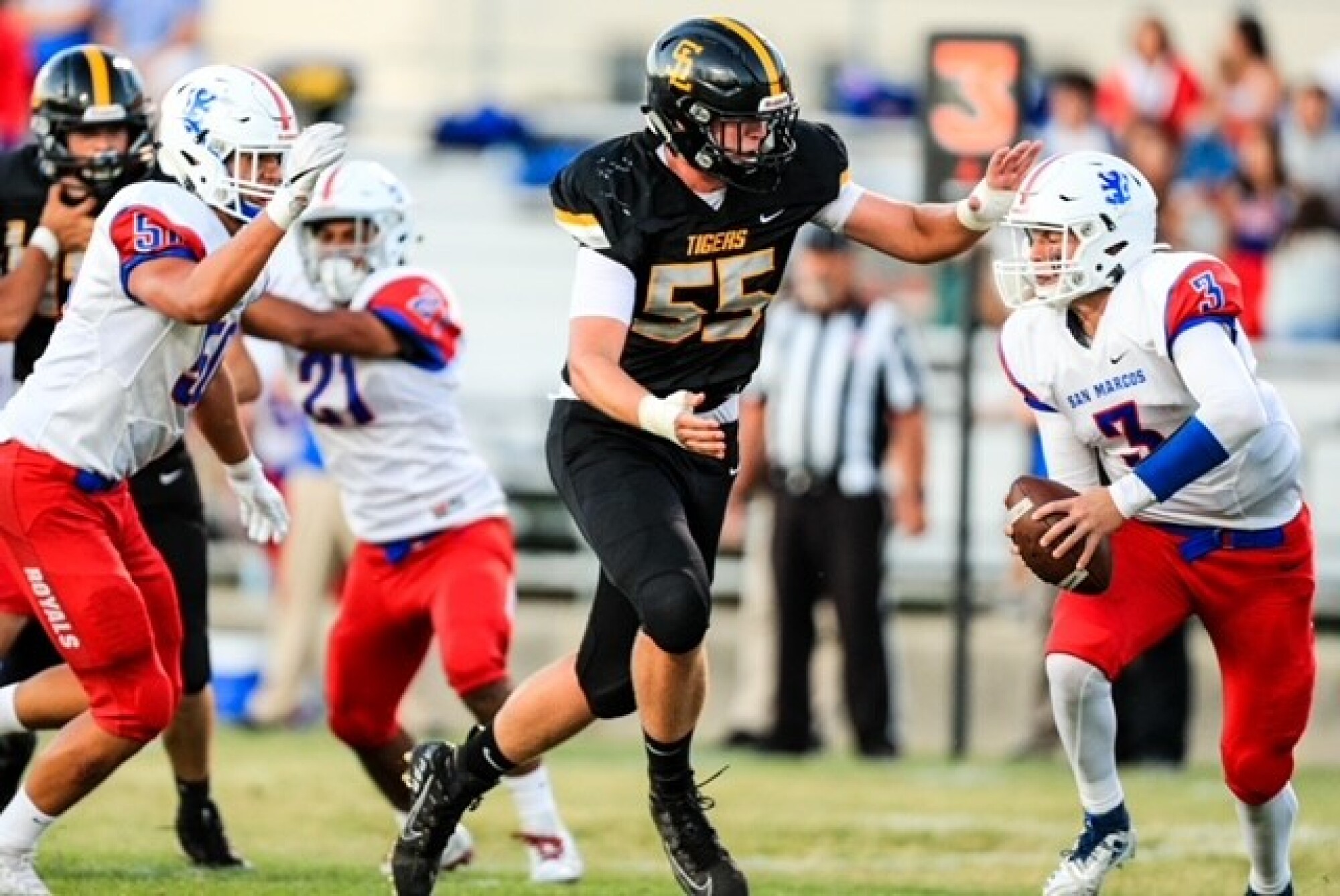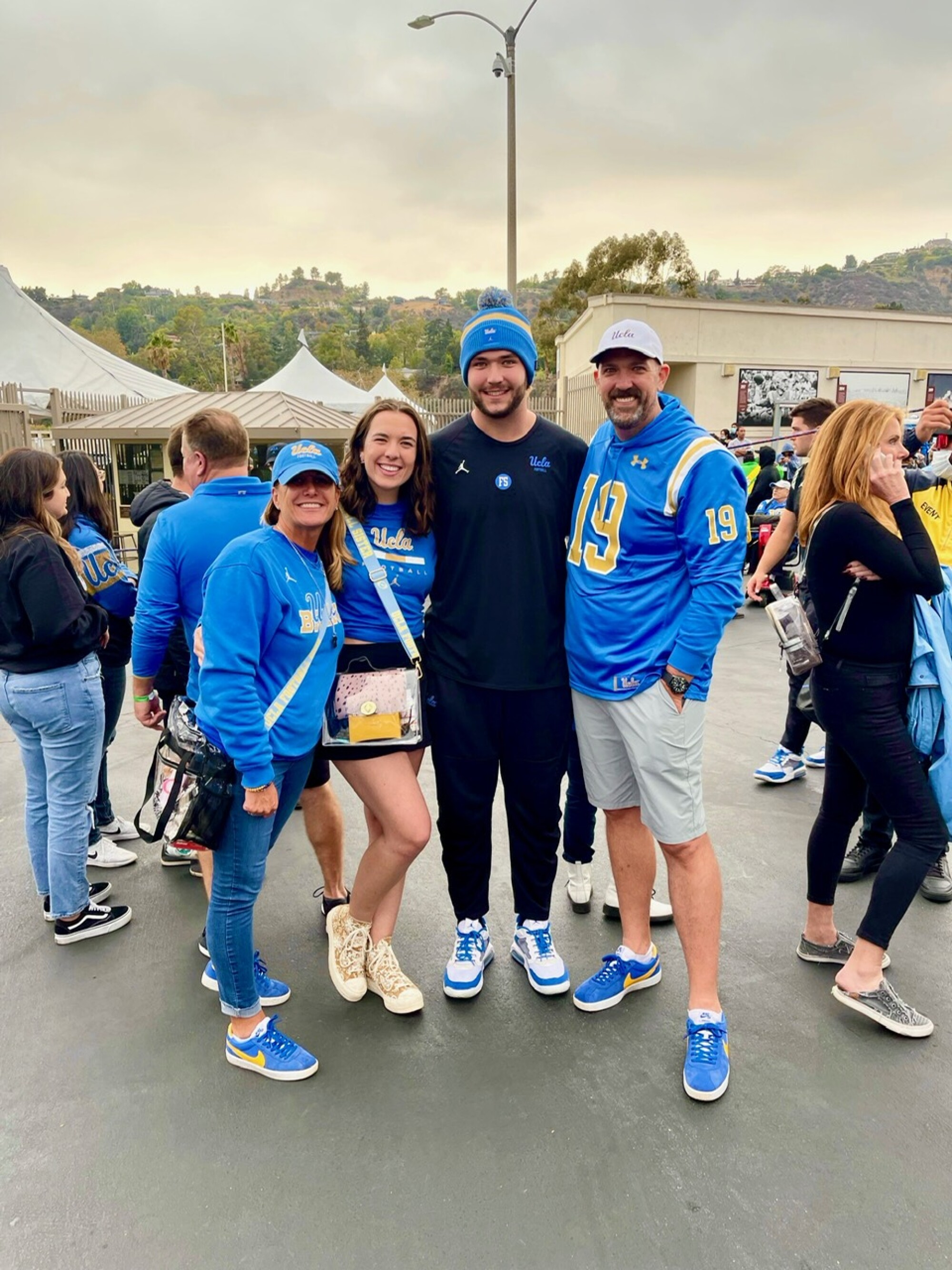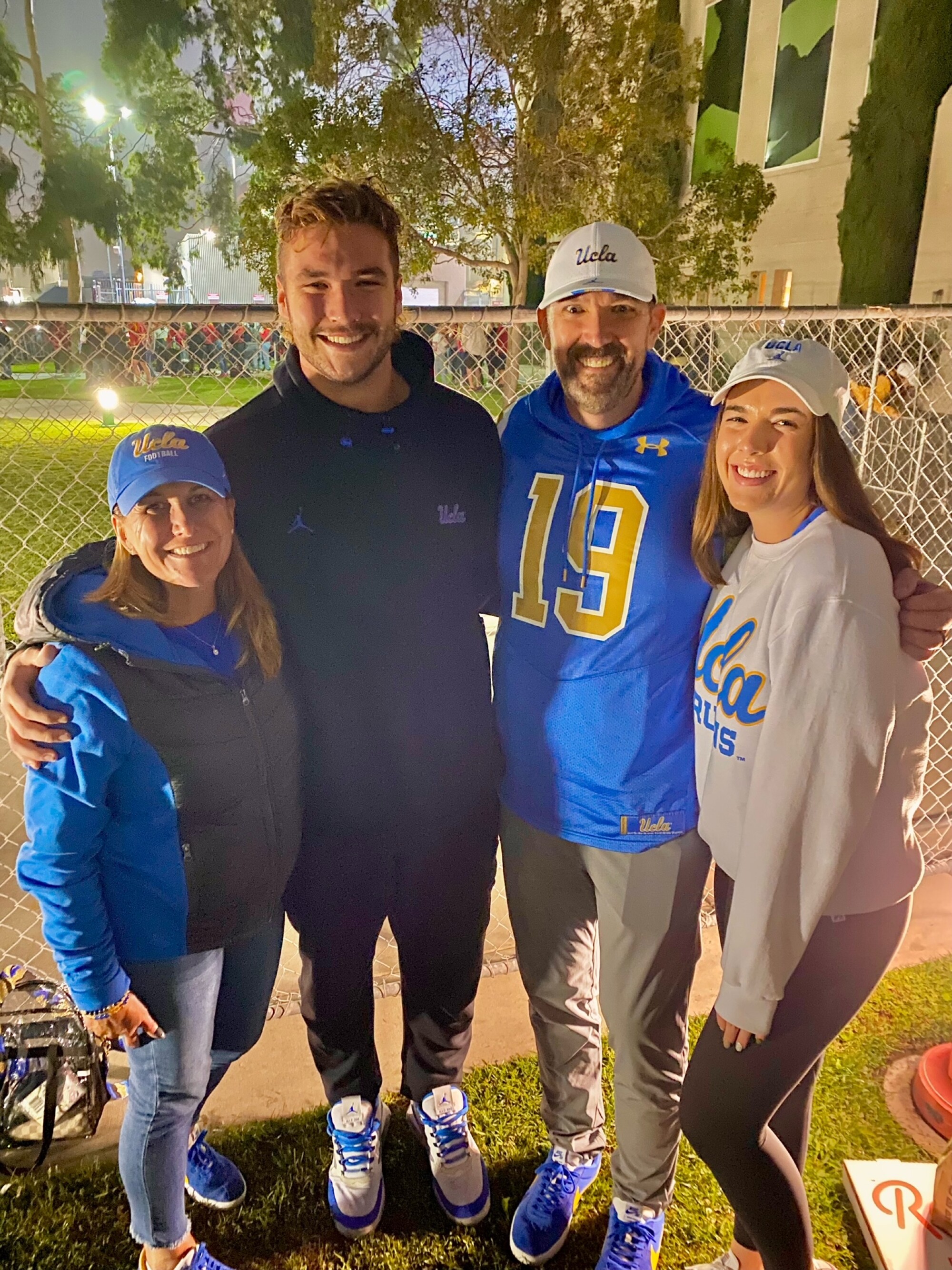Ex-UCLA lineman Thomas Cole hopes sharing his mental health journey will help others.
(A warning: This story discusses self-harm and suicide.)
The smile that split Thomas Cole’s face on video chats with his parents couldn’t hide the darkness that had overtaken his life.
His mother noticed that he was always lying in bed. The blinds were invariably drawn.
Thomas shrugged it off as not being able to easily fit his 6-foot-6, 270-pound frame into his desk. He said it was easier keeping the blinds closed.
“He always had a justification,” his mother, Kelli, said, “but for me they were red flags.”
Thomas never mentioned his intractable burden: He woke up every day wanting to kill himself.
He pushed through the torment only because his schedule demanded he get moving. There was football practice. Position meetings. Classes. Everything that came with being a college freshman.
“You’ve got stuff to do,” he said. “You’ve got boxes to check.”
Anyone watching from afar would have considered his future promising. The offensive lineman from San Luis Obispo was the most coveted high school prospect from his area in 20 years, picking UCLA from a lengthy list of suitors. His size and talent made him a potential savior for the Bruins at offensive tackle in the years to come.
In his mind, Thomas was never good enough.
Even though his grades were fine and he was trying his best in practice, he felt like a failure. After months of anguish, he was ready to give up the charade.
Thomas put on his favorite music, Johnny Cash and Zach Bryan songs filling his apartment bedroom. He wrote goodbye letters to his family and friends. He downed every pill he could find.
Then he lay down to die.
They were the All-American family.
David and Kelli Cole met as college athletes at Cal Poly and owned a Chrysler, Dodge, Jeep and Ram dealership in San Luis Obispo that had been in David’s family for three generations. Their daughter, Katie, wrote for the high school newspaper before going on to study child development in college.
Like his parents, Thomas was a gifted athlete. Already towering over his classmates, he played varsity basketball as a high school freshman. He also starred on the football team, first as a defensive lineman and tight end before switching to the offensive line because of his massive frame.
During his final season, Thomas helped the Tigers win a league title in football for the first time in 17 years.
But nothing felt satisfying. Thomas would have a great game and dwell on a missed tackle or a blown assignment.
“He was always really hard on himself,” David said.
Self-punishment would follow. Thomas stayed after practice to run extra sprints. He lingered in the weight room for additional reps. All of it was an attempt to prove to himself that he was good enough, leading only to more doubt and an endless loop.
After his parents noticed he was having trouble remembering football plays, Thomas was diagnosed with attention deficit hyperactivity disorder the summer following his freshman year. The disorder is known to contribute to low self-esteem and places its sufferers at increased risk of mood complications such as depression.
Those who watched Thomas closely considered him a people-pleaser. When his basketball coach addressed the team while sitting in a timeout huddle fraught with tension, Thomas circled behind his coach, rubbed his shoulders and told him it was going to be OK.
The gentle giant also won admirers by coming to the defense of younger classmates who were bullied and constantly checking in with teammates about their welfare. When Jeff Brandow stepped down as San Luis Obispo’s athletic director and basketball coach, the first text he received each time was from Thomas.

Thomas Cole (55) played for San Luis Obispo High.
(Owen Main)
Looking back, there were signs of distress. A dislocated finger suffered in a basketball game sent Thomas to the hospital, the bone sticking out of his skin. Disregarding the sympathy that flooded his room, Thomas was beside himself. His reasoning? He no longer could help his team.
“He was like, ‘Coach, I’m not going to be able to play, I feel like I let you guys down,’ ” Brandow said. “I’m like, ‘Dude, you broke your finger. You’re out for the rest of the year. It’s OK. We love you still.’ But he was worried about letting people down.”
Thomas enrolled at UCLA in January 2021, skipping his final high school football season to take part in the Bruins’ spring practice while also getting a head start in the team’s strength and conditioning program.
There was no pressure to play immediately with veterans Sean Rhyan and Alec Anderson entrenched at tackle. The focus, for the first season, would be improvement.
At first, Thomas lived alone in a dorm room. Interaction with teammates was limited by design amid the COVID-19 pandemic, players grabbing to-go bags of food and eating by themselves. Classes were remote. Despite every protective measure, Thomas contracted COVID-19 at the start of spring quarter, leading to more isolation.
His parents factored all of this into their calculus of his early college months.
“When we started realizing that things were not going well,” Kelli said, “part of it was, well, how much is COVID, how much is first-year college depression — missing home. So there were a lot of factors in play.”
A reprieve came every time Thomas interacted with the other freshmen on the offensive line, whom he quickly came to adore. Moving into an apartment in the summer provided the benefit of a roommate in kicker Anthony Waller, another friend.

UCLA football player Thomas Cole, center, is joined, from left, by his mother, Kelli; sister, Katie; and father David.
(Courtesy of the Cole family)
But their time together was short-lived, with Waller quitting the team and moving out before the start of fall training camp. Once again, Thomas was alone. The daily grind worsened his depression.
“You’d get to workouts, go to meetings, eat as much food as you could put down and then just kind of crawl back into your room and isolate,” Thomas said. “There wasn’t a ton of communication between like how I was feeling with the team.”
Crying fits often preceded those smiling FaceTime sessions with his parents. Thomas began to hurt himself, thinking he deserved the pain. He burned his body with anything that would do the trick — lighters, candles or forks placed on hot stoves. He starved himself, eating once every two days.
“I didn’t think I was enough in school, didn’t think I was enough as a son, didn’t think I was enough as a teammate, so like I just deserved punishment,” Thomas said. “Like, I hated myself.”
He told one teammate and his girlfriend that he was feeling down. He started seeing a therapist in the fall. But he never shared his suicidal thoughts or the fact that he often woke up regretting that he didn’t try to kill himself the previous night.
“Everyone supported me in their own way,” Thomas said, “but unless you’re trained, unless you’re in the field, no one knows what to say when you tell them how unhappy you are.”
By the time he returned home after the COVID cancellation of UCLA’s Holiday Bowl in late December, his family could sense his unease. A probing conversation ensued on New Year’s Day, Thomas agreeing to allow his mother to speak with his therapist to ensure she had the full picture of his problems.
“We weren’t sure what he was telling her because we realized at this point he was withholding a lot of information on his feelings and all that,” Kelli said, “so we wanted to make sure that the therapist knew where he was at.”
Shortly after he returned to school, Thomas told his parents that he knew what he needed to work on, that he was going to get better.
Six hours later, he wrote his goodbye letters.
Up late writing a paper for class, Thomas paused to consider what he would feel like in the morning.
He didn’t want to regret, once more, not having put an end to the suffering.
“I was ready to surrender,” he said.
He sat down to compose his farewells, penning letters to his family and shorter notes to friends.
In his letter to his father, who also had long battled depression, Thomas explained that this was the best move for him, to relieve himself of the pain. He didn’t want his father to dwell on it. This wasn’t anyone’s fault.
Then Thomas started downing pills. As his favorite music played, he took as many painkillers and as much prescription medication as he could find. Anything Thomas could get his hands on, he swallowed, about 200 pills in all.
“I was dying,” he said.
Only, he didn’t die. Thomas awoke early in the morning in a cold sweat, vomiting on his floor. He was irate.
“I didn’t know what to do,” he said, “if I wasn’t going to die.”
He considered cleaning himself up and going to practice as if nothing had happened before relenting and calling his therapist. She told him she was thankful he was alive and he needed to go to the hospital.
Thomas packed a bag and made the short walk to Ronald Reagan Medical Center to check himself in. For two days, an electrocardiogram measured his resting heart rate from 120 to 150 beats per minute, elevated by all the stimulants. Doctors told him he had survived only because he had purged the pills that otherwise would have killed him.
Suicides involving athletes from Southern California have become a disturbingly common narrative. Katie Meyer, a Stanford goalkeeper who starred in high school at Newbury Park, took her life in March. A month later, Wisconsin runner Sarah Shulze, who grew up in Oak Park, killed herself, her family saying the stresses of athletics, academics and everyday life had “overwhelmed her in a single, desperate moment.”
Coaches and college administrators increasingly have spoken about buttressing a mental health support system that continues to fail those in distress.
“We’re one of the lucky ones,” Kelli Cole said. ”We get a second chance.”
Thomas’ teammates learned he was at the hospital by checking his location on Snapchat when he didn’t show up for practice, but they could not see him because of privacy restrictions. Thomas’ therapist let his parents know what had happened. They immediately made the three-hour drive to campus, even though they were barred from seeing their son because of COVID protocols.

Former UCLA football player Thomas Cole, second from left, is joined by his mother, Kelli; father, David; and sister, Katie.
(Courtesy of the Cole family )
They called his room to let him know they were nearby and that they loved him.
“We just said, ‘We’re close, we’re at the hotel,’ ” Kelli said, her voice cracking, “and that had to be it.”
Thomas remained in the hospital’s psychiatric ward for 10 days before starting a months-long transition toward independent living. Along the way, he relapsed while contemplating another suicide attempt, necessitating a trip back to the hospital.
Through intensive therapy, he lost the urge to inflict unspeakable harm upon himself. Adjusting his medication also helped, and so did meditation. Mostly, he learned to express how he was feeling.
“The goal wasn’t to learn to want live, it was to not want to die,” Thomas said. “Just find stability. Not wanting to die is like not actively trying to hurt myself or bring myself down or commit suicide. … I’m in a much better place. I don’t want to hurt myself as much as I did and like I don’t actively try to hurt myself. If I feel that way, I reach out for help and I talk to people and I surround myself with others.”
Family therapy has led to healing, as well as heartbreaking revelations about the anguish Thomas endured.
“One of the things in therapy that always stuck out to me,” David recalled, “[Thomas] said, ‘Dad, I would wake up and wonder who I was going to disappoint.’ ”
A few weeks ago, Thomas revealed publicly why he had not been present at spring practice.
He tweeted about his suicide attempt as a farewell announcing his retirement from football. He mentioned fellow freshman offensive linemen Benjamin Roy, Garrett DiGiorgio, Noah Pulealii and Taka Mahe, thanking them for lifting his spirits.
At Pac-12 media day Friday, another teammate blamed himself for contributing to Thomas’ ordeal by being unaware of his struggles.
“I feel like I failed as a leader, didn’t really reach out to him,” offensive lineman Jon Gaines II said. “This needs to be a learning experience for all of us in how we’re going to approach our mental health and how we’re going to really open up and talk to each other.”
Gaines said Corey Miller, the team’s director of speed and movement, was holding “Friday real talks” to support players by allowing them to discuss issues and feel heard.
Thomas said his goodbyes to offensive line coach Tim Drevno and director of football performance Keith Belton in person, Belton wrapping him in a tight embrace.
“Tommy’s like, ‘I’m not coming back,’ ” David said, recalling the exchange, “and K.B. goes, ‘I don’t care about that, I just want you here.’ ”
Thomas agreed to speak openly about his struggles because he wanted to help others by detailing — and normalizing — mental health challenges. He also wanted to provide tips that could be useful.
“The biggest thing that I’ve found is asking for help, it’s just being able to reach out to people closest to you,” Thomas said. “People want to help, people want to see you live, people want to see you have the best life you possibly can, and so if you can just reach out and ask them for help, like from your coaches or your teammates or like anyone at the school, it could save your life.”
Suicide prevention and crisis counseling resources
If you or someone you know is struggling with suicidal thoughts, seek help from a professional and call 9-8-8. The United States’ first nationwide three-digit mental health crisis hotline 988 will connect callers with trained mental health counselors. Text “HOME” to 741741 in the U.S. and Canada to reach the Crisis Text Line.
After months of withdrawing from others, Thomas now immerses himself in daily conversations with family and friends. Late this week, he completed his outpatient program and moved in with some high school buddies in San Luis Obispo.
Next month, he’ll start classes toward a degree in fire technology at Allan Hancock College in Lompoc. Eventually, he’ll join a new brotherhood as a firefighter.
But he’ll always be a Bruin. His family has kept its hotel reservations for the weekends of UCLA’s home games this season and Thomas wants to support his friends, whether it’s strolling the sidelines or sitting in the stands. This past week, coach Chip Kelly called to let him know he still was part of the program.
“I intend on going to every game,” Thomas said. “I love those guys.”
In the meantime, his conversations with his parents have gone from vacant to vulnerable, no topic off limits.
“Now that I have that barrier down, we talk about everything,” Thomas said. “We talk about good days and more importantly, I tell them about the bad days. It’s a little scary, in all honesty. I feel bad, like I’m putting stress on them — unnecessary stress — but I know deep down to tell them and keep them in my loop. They have been so honest with telling me how they’re feeling.”
After years of hiding, Thomas has found the strength to do the same.
If you or someone you know is struggling with suicidal thoughts, seek help from a professional and call 988. The United States’ first nationwide three-digit mental health crisis hotline, 988 will connect callers with trained mental health counselors. Text “HOME” to 741741 in the U.S. and Canada to reach the Crisis Text Line.
For all the latest Sports News Click Here
For the latest news and updates, follow us on Google News.
